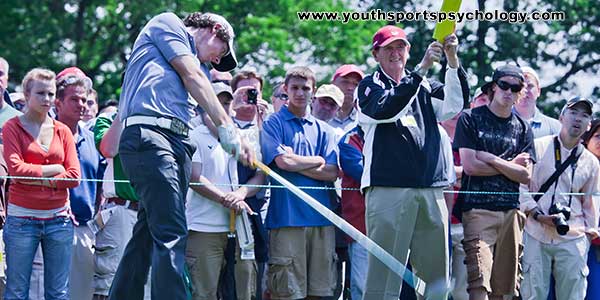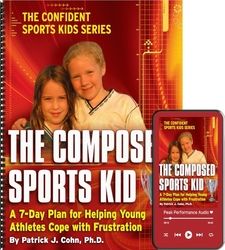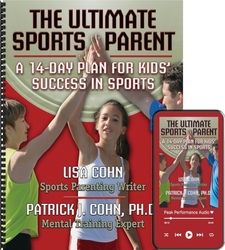
How Athletes Can Hit the Reset Button
Athletes often ask, “I’m afraid my last bad game will be followed by other bad performances. How do I avoid following into a slump after a bad game?”
It’s often hard for athletes to get over tough performances. They think a bad game will lead to more. These athletes often see themselves as lacking ability, not being good enough, or feeling they can’t bounce back.
It’s important for these young athletes to understand that they can–and should–reset, wipe the slate clean and start anew, embracing new opportunities.
This may sound like it’s easier said than done. Kids often have a hard time letting go of the past and moving forward. Past performances can haunt your athletes.
Truth is, with the right mindset, kids can move forward after a bad performance and see the opportunities that await them.
Take golfer Rory McIlroy, who came from behind at the 2019 Tour Championship and won the Tour Championship and, along with it, the FedEx Cup.
Resetting After a Loss
McIlroy has the right attitude. He says he sees the start of each round of golf as a totally new competition.
“I try to treat it like any other event, try to pretend like everyone was starting at even,” he says. “And my goal this week was to just try to shoot the lowest score of the week, try to score the best score and if that wasn’t good enough then so be it.”
McIlroy understands that yesterday’s events won’t affect how he will perform today. With this attitude, he is able to let go of past performances.
Young athletes can learn from his attitude. They, too, can wipe the slate clean and begin anew. The key to achieving this mindset is for kids to avoid focusing on the past. Instead, they need to concentrate on how they can make things happen in the present.
They need to let go of their bad performance and mentally hit the reset button.
Many successful athletes know how to do this.
One method is the “Next Strategy.” All kids need is a notebook for evaluating their performances. In the notebook, they should make two columns on a page.
Ask young athletes to label the first column as “performance evaluation.” For each game or performance, here they should write a brief synopsis of how they performed, including the good and bad.
They should add their thoughts and feelings about the competition. That might include, “I was so excited I scored the last goal!” or “I was bummed when I missed that important shot.”
Kids should label the second column “Next.” In this column they should write what they want to focus on in practice to perform well during competition.
They should focus on growth for the future. For example, soccer players might write, “Block more shots on goal,” or “Move faster to block shots.”
Young athletes who invest the time, thought and commitment to this strategy will see just how much they can improve their mental game after a bad performance.
Soon enough, they’ll be hitting the reset button, bouncing back quickly and boosting their confidence.
Help Your Young Athletes Let go of Mistakes and Cope With Frustration!

Do you feel sick and tired of or even embarrassed about your athletes’ tantrums, crying, and lack of emotional control in competition? Do you scratch your head and wonder why your kids shut down or act like The Incredible Hulk after they make just one mistake that no one notices?
If so, learn more about The Composed Sports Kid.
This is a 7-day program for sports parents and kids to learn composure-boosting lessons!
The Composed Sports Kid system is really two programs in one–one program to train parents and coaches how to help their kids practice composure, and one program that teaches young athletes (ages 8-12) how to improve composure, let go of mistakes quickly, have more self-acceptance, and thus enjoy sports more!
Read more about The Composed Sports Kid.
What are parents and coaches saying?
“I think that you have one of the most comprehensive and valuable web sites anywhere! I have downloaded a number of your eBooks and have read most of your emails and have found them very useful. As a parent my number one concern is to be able to handle any situation that comes up and be confident that I am on the right path in giving my kids the best information that I can.”
~ Sports Parent
“We really enjoy your emails and are grateful that we found your web site. It is so needed. There really isn’t much out there to guide the parent. Thank you for your work. And yes, we have passed on your web site to numerous parents.”
~ Debbie and Peter Cooney
“I use your tips to help a sophomore high school student athlete. Last night, after I gave him some of your email tips – relax, get in the flow of the game, have fun, play by instinct, etc. – He busted loose for a career high 20 points and 15 rebounds!”
~ Bob Heidkamp
“I must say that each tip from you is helping untangle little by little a bit of a fix that my 10-year-old daughter’s badminton had got into. Wow ! the number of mistakes we have made as sports parents. I do wish I had visited your site, before she started a competitive level last year. Would have saved us a lot of unnecessary worry.”
~ Lopamudra
Help Young Athletes Overcome Perfectionist Challenges in Sports!

Sports Parents’ Top Dilemma: Helping Young Athletes Kick Perfectionism And Fear of Failure will walk you through the problem and arm you with practical solutions.
The Sports Parents’ Top Dilemma is a two part program. It includes:
- A 23 page E-book that identifies the challenge, explains why it is harmful to young athletes and gives step-by-stop sports psychology tips for helping kids.
- A 21 page kids’ sports psychology workbook that is intended to help you kids identify beliefs and expectations that are the root of perfectionism.
Now you can learn how to help young athletes overcome the difficult cycle of perfectionism, fear of failure and loss of confidence!
Sports Parents’ Top Dilemma: Helping Young Athletes Kick Perfectionism And Fear of Failure
What are parents saying?
“I think the material on your web site and the communications I receive are excellent. I find the advice practical and the topics that are discussed, very relevant to my own experiences. I feel very happy with my purchase of the Ultimate Sports Parent Program. Your materials are top class. I will continue to study them.”
~David Wormald, Sports Parent
“I just listened to ‘The Ultimate Sports Parent Program‘ on a drive back from North Carolina. Every parent should be required to listen to it! I thought it was great. Thank you.”
~Rita, Sports Parent
“I recently purchased The Composed Sports Kid CD program for my son Jonathan who is 10. He is a skilled soccer player that was having issues with loss of control on occasion during games. He has really benefited from the program. He carries himself much better these days and even talks about his composure after the game to me before talking about the goals that he scores.”*
~Dave, Sports Parent
“Kids’ Sports Psychology is quite a find. It’s a treasure trove of practical, insightful information presented in an organized, simple format that is so easy to use. It is exactly what I was looking for to help my daughter succeed in competition, as much as she succeeds during practice. Additionally, these concepts can be applied to all areas of her life and, as her parent, I can’t stress enough how important it is to me, that she develop confidence, and how valuable this resource is to that end. Thank you so much!“*
~Stephanie Dobbs
